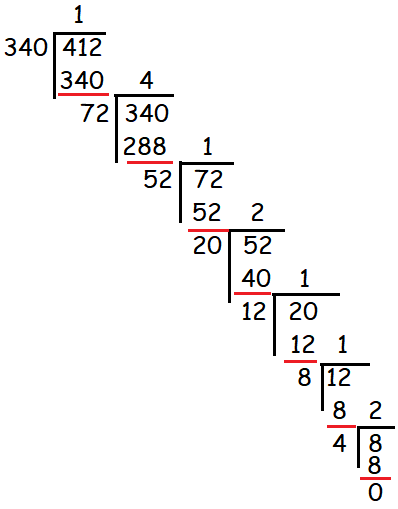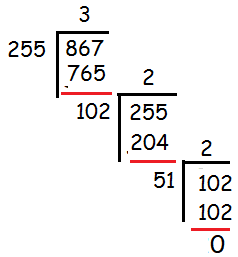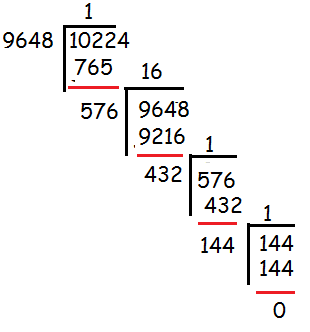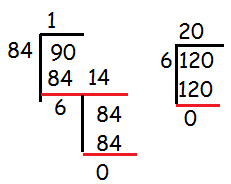DIVISION ALGORITHM PROBLEMS
Subscribe to our ▶️ YouTube channel 🔴 for the latest videos, updates, and tips.
Problem 1 :
Prove that square of any integer leaves the remainder either 0 or 1 when divided by 4.
Solution :
Let n be the integer, we wish to square.
Case 1 :
If n is even...
let n = 2m
n2 = 4m2
Hence n is divisible by 4 and leaves the remainder 0.
Case 2 :
If n is odd...
let n = 2m+1
n2 = (2m + 1)2
n2 = (2m)2 + 2(2m) + 12
n2 = 4m2 + 4m + 1
n2 = 4(m2 + m) + 1
Hence n is divisible by 4 and leaves the remainder 1.
Problem 2 :
Use Euclid’s Division Algorithm to find the Highest Common Factor (HCF) of
(i) 340 and 412
Solution :
a = 340 and b = 412
412 > 340
412 = 1 (340) + 72
340 = 4(72) + 52
72 = 1(52) + 20
52 = 2(20) + 12
20 = 1(12) + 8
12 = 1(8) + 4
8 = 2(4) + 0

Hence the required H.C.F is 4.
(ii) 867 and 255
Solution :
a = 867 and b = 255
867 > 255
867 = 3(255) + 102
255 = 2(102) + 51
102 = 2(51) + 0

Hence the H.C.F is 51.
(iii) 10224 and 9648
Solution :
10224 > 9648
10224 = 1(9648) + 576
9648 = 16(576) + 432
576 = 1(432) + 144
432 = 3(144) + 0

Hence the H.C.F is 144.
(iv) 84, 90 and 120
Solution :
90 > 84
90 = 1(84) + 6
84 = 6(14) + 0

Hence the required H.C.F is 6.
Problem 3 :
Find the largest number which divides 1230 and 1926 leaving remainder 12 in each case.
Solution :
1230 - 12 = 1218
1926 - 12 = 1914
Now we have to find H.C.F of 1218 and 1914.
1914 = 1218(1) + 696
1218 = 696(1) + 522
696 = 522(1) + 174
522 = 174(3) + 0
Hence the largest number which divides 1230 and 1926 leaving remainder 12 is 174.
Problem 4 :
If d is the Highest Common Factor of 32 and 60, find x and y satisfying d = 32x + 60y .
Solution :
60 > 32
60 = 32(1) + 28 ----(1)
32 = 28(1) + 4 ----(2)
28 = 4(7) + 0 ----(3)
Hence the H.C.F of 60 and 32 is 4.
d = 4
d = 32x + 60y
4 = 32 x + 60 y
From (2), let us solve for 4
4 = 32 - 28(1) ---(4)
From (1), let us solve for 28
28 = 60 - 32(1)---(5)
By applying the value of 28 from (5) into (4), we get
4 = 32 - (60 - 32(1)) ⋅ 1
4 = 32 - 60 ⋅ 1 + 32 (1) ⋅ 1
4 = 32 + 32 (1) - 60 ⋅ 1
4 = 32(1 + 1) - 60 ⋅ 1
4 = 32(2) + 60 (-1)
Instead of x, we have 2 and instead of y, we have -1.
Hence x = 2 and y = -1.
Problem 5 :
A positive integer when divided by 88 gives the remainder 61. What will be the remainder when the same number is divided by 11?
Solution :
Let "n" be that integer number.
We are given that (n-61) is divisible by 88.
Hence, (n-61) is divisible by 11.
It is the same as to say that ((n-55)-6) is divisible by 11.
55 is divisible by 11
It means that the number n gives the remainder 6 when is divided by 11.
Problem 6 :
Prove that two consecutive positive integers are always coprime.
Solution :
Let two consecutive numbers are x and x + 1
H.C.F of (x, x + 1) = n, because it cannot be equal to 1, n is natural and n > 1
n divides n both x and x + 1.
then n divides x + 1 - x
Hence n divides 1 or n = 1
But we have assumed n > 1
So by contradiction x & x + 1 are co-prime.
Subscribe to our ▶️ YouTube channel 🔴 for the latest videos, updates, and tips.
Kindly mail your feedback to v4formath@gmail.com
We always appreciate your feedback.
About Us | Contact Us | Privacy Policy
©All rights reserved. onlinemath4all.com

Recent Articles
-
US Common Core K-12 Curricum Algebra Solving Simple Equations
Jan 07, 26 01:53 PM
US Common Core K-12 Curricum Algebra Solving Simple Equations -
10 Hard SAT Math Questions (Part - 4)
Jan 05, 26 06:56 PM
10 Hard SAT Math Questions (Part - 4) -
10 Hard SAT Math Questions (Part - 3)
Jan 05, 26 06:34 PM
10 Hard SAT Math Questions (Part - 3)

